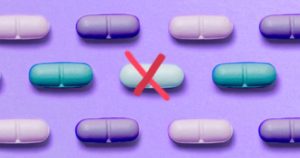How to get rid of a cold fast:
Do's & Don’ts
Ah-choo! When the first signs of a cold strike, you spring into action, desperate to try or take anything that may help you feel better. While there’s no cure for the common cold, there are things you can do to reduce the severity of symptoms and potentially shorten the time you feel sick. On the flipside, there are also things you can avoid that would likely make you feel worse and increase your risk of developing cold-related conditions like a sinus infection or bronchitis.
Wondering what to do and not do when a cold strikes and you want to feel better fast? We break down the do’s and don’ts of how to beat a cold.
How to fight off a cold: 4 do's
Do rest up
Adults should get seven to nine hours of sleep each night. When you’re under the weather, your body needs even more rest. That’s because your immune cells kick into high gear during sleep. So if you don’t sleep enough, your body may have a harder time warding off viruses, including the ones behind your sniffles and sneezes.
Do stay hydrated
When fighting a cold, your body increases mucus production to flush out germs, which often results in you blowing your nose – a lot. To help keep mucus draining and flowing and to prevent dehydration, drink lots of water and other nonalcoholic and caffeine-free beverages. Additionally, you may want to consider using a humidifier at night or inhaling warm steam while in the shower to keep your mucus membranes hydrated.
Do eat well
There’s no doubt that what you put into your body can directly affect – for better or worse – how you feel. To give your body the energy it needs to fend off a cold, focus on foods that are nutrient dense and easy to digest. Try soups, broths, fruits and yogurts.
Do manage symptoms
From a headache and sinus pain to a scratchy and sore throat, cold symptoms can make you feel pretty miserable. To help ease the aches, pains and general discomfort from a cold, consider taking over-the-counter medications like ibuprofen or acetaminophen. To reduce swelling and open nasal passages, try an oral decongestant or nasal spray. And an over-the-counter expectorant like Mucinex® that contains the ingredient guaifenesin can help thin mucus and make your cough more productive.
If you do take over-the-counter cold medications, remember to closely follow the package dosing instructions.
How to beat a cold: 4 don’ts
Don’t overdo cold meds
While it’s okay to take over-the-counter medications for a few days to help manage cold symptoms, using them long term can be counterproductive. For example, relying on decongestants for too many days in a row can cause rebound congestion and actually make your symptoms worse.
Also, avoid taking cold meds that contain ingredients you don’t need and treat symptoms you don’t have. While these products are often marketed as treating multiple symptoms or providing maximum relief, it’s best to avoid any possible side effects from ingredients you won’t even benefit from.
Don’t take antibiotics
Colds are caused by viruses, not bacteria. That means taking antibiotics when you have a cold won’t help. In fact, it’s dangerous to take antibiotics anytime you don’t need them – doing so can lead to health complications related to antibiotic resistance.
Don’t drink alcohol
It’s always important to take care of your body, but it’s even more important when you have a cold. So yes, drink a lot when you have a cold, but not alcohol. Alcohol is a diuretic, so it actually works to dehydrate your body. Plus, alcohol can weaken your immune system, which is already working overtime when you have a cold.
Don’t expose others
Life doesn’t stop just because you get a cold, and it can be hard to miss work or school. But taking cold medicine and carrying on with your normal daily activities isn’t only bad for your health, it’s bad for the health of people around you. Cold viruses, like all viruses, are highly contagious. If you’re not feeling well, lay low and rest up for a few days.
How to know if it’s just a cold?
Once you get a cold, there’s no quick cure. While there are ways to manage symptoms and assist your body in fighting off a cold virus, time is the only effective cure, and, unfortunately, cold symptoms can linger for one to two weeks. A cold can also develop into other conditions like bronchitis or a sinus infection that may require prescription medications.
Some cold symptoms also overlap with COVID-19 symptoms. So if you come down with a cold, it’s a good idea to test for COVID-19.
In general, it can be difficult to know if you have a cold, the flu or some other condition. To be safe, it’s a good idea to reach out to a clinician online through Virtuwell who can assess your symptoms and provide a diagnosis, treatment plan and prescription or over-the-counter medications.
Fight against respiratory viruses
No one likes getting sick, and prevention really is the best medicine. To ward off cold viruses, make sure to frequently wash your hands, avoid touching your face and steer clear of people you know are sick. You can also reduce your risk of getting viruses that cause influenza and COVID-19, by getting vaccinated.

